
langwatch
The open LLM Ops platform - Traces, Analytics, Evaluations, Datasets and Prompt Optimization ✨
Stars: 2494

LangWatch is a monitoring and analytics platform designed to track, visualize, and analyze interactions with Large Language Models (LLMs). It offers real-time telemetry to optimize LLM cost and latency, a user-friendly interface for deep insights into LLM behavior, user analytics for engagement metrics, detailed debugging capabilities, and guardrails to monitor LLM outputs for issues like PII leaks and toxic language. The platform supports OpenAI and LangChain integrations, simplifying the process of tracing LLM calls and generating API keys for usage. LangWatch also provides documentation for easy integration and self-hosting options for interested users.
README:
Website · Docs · Discord · Self-hosting
LangWatch is the leading LLM Ops platform on evaluation capabilities and user-friendly collaboration — evaluate, debug, and optimize your Agents and LLM pipelines together with your team, locally or in the cloud, with Open-Telemetry native integrations.
- Observability - Add tracing to your LLM, based on the OpenTelemetry standard, allowing LangWatch to provide real-time powers.
- Evaluation - Run real-time and offline evaluations against production or synthetic datasets. Compare performance across various matrixes (prompts, modules, hosting providers, and complete LLM pipelines).
- Datasets - Automatically created from traced messages, or upload, datasets which can be used across the platform for evals.
- Optimization Studio – Build and run evaluations faster with our no+lo 🧘 code studio. If you need more flexibility, you have access to the DSL that powers it too.
- Prompt Management & Optimization – Version prompts, test changes on datasets, and improve real-world performance. Auto-optimize with DSPy's MIPROv2 to generate better prompts and few-shot examples.
- Annotations - Human in the Loop, done right. Accelerate better data creation by combining domain expert input with smart workflows. Use LangWatch's intuitive annotation interface to collaborate directly with experts while keeping full control over your code. Quickly generate high-quality labels, catch edge cases, and fine-tune datasets to build more accurate, robust AI models.
LangWatch is framework- and LLM-agnostic, with support for (LangGraph, DSPy, Langflow, Flowise, Vercel, Mastra, Agno and others) and LLM providers (OpenAI, Azure, Bedrock, Gemini, Deepseek, Groq, MistralAI, VertexAI, LiteLLM, and others) via OpenTelemetry.
Our use of open, and community-driven standards enables your team to be flexible to the rapidly changing AI ecosystem without worrying about compatibility.
The easiest way to get started with LangWatch.
Create a free account to get started.
Get up and running in your own machine using docker compose:
git clone https://github.com/langwatch/langwatch.git
cd langwatch
cp langwatch/.env.example langwatch/.env
docker compose up -d --wait --build
open http://localhost:5560You'll be launched right into our onboarding flow. Welcome aboard 🫡.
Run LangWatch on your own infrastructure:
- Docker Compose - Run LangWatch on your own machine.
- Kubernetes (Helm) - Run LangWatch on a Kubernetes cluster using Helm for a production-ready setup.
- OnPrem - For high-scale deployments, we offer cloud specific setups for AWS, Google Cloud and Azure.
- Hybrid (OnPrem data) - For companies that have strict data residency and control requirements, without needing to go fully on-prem.
Self-hosted (OnPrem) ⚓️
LangWatch offers a fully self-hosted version of the platform for companies that require strict data control and compliance, complete with Azure AD support.Read more about it on our docs.
Hybrid (OnPrem data) 🔀
LangWatch offers a hybrid setup for companies that have strict data control and compliance requirements, without needing to go fully on-prem.Read more about it on our docs.
Local Development 👩💻
You can also run LangWatch locally without docker to develop and help contribute to the project.Start just the databases using docker and leave it running:
docker compose up redis postgres opensearchThen, on another terminal, install the dependencies and start LangWatch:
make install
make startGet observing in minutes. Now you have an account and have created a project inside LangWatch, lets get your messages flowing through LangWatch.
[!NOTE] Not using Python or OpenAI? Don't worry, we have your back . Visit our docs for full guides for other popular languages, LLM providers, and frameworks.
Available for install via pip, or uv. The SDK will also check your environment variables by default for your API key and endpoint.
pip install langwatchLANGWATCH_API_KEY="sk-lw-..."
# This is only needed if you aren't using LangWatch Cloud.
# LANGWATCH_ENDPOINT="https://self-hosted-url.internal/"import langwatch
from openai import OpenAI
client = OpenAI()
@langwatch.trace()
def main():
langwatch.get_current_trace().autotrack_openai_calls(client)
...You can also view a public share of the trace here.
LangWatch builds and maintains several integrations listed below, additionally our tracing platform is built on top of OpenTelemetry, so we support any OpenTelemetry compatible library out of the box.
We also support various community standards, such as OpenInference, OpenLLMetry, and more.
Our Python SDK supports the following auto-instrumentors.
Though OpenTelemetry, we also support all the frameworks and providers that support them, such as:
- AWS Bedrock
- Haystack
- CrewAI
- Autogen
- Grok
- …and many more
You can find a full guide on our docs.
Our JavaScript SDK supports the following instrumentors:
Are you using a platform that could benefit from a direct LangWatch integration? We'd love to hear from you, please fill out this very quick form.
Have questions or need help? We're here to support you in multiple ways:
- Documentation: Our comprehensive documentation covers everything from getting started to advanced features.
- Discord Community: Join our Discord server for real-time help from our team and community.
- GitHub Issues: Report bugs or request features through our GitHub repository.
- Enterprise Support: Enterprise customers receive priority support with dedicated response times. Our pricing page contains more information.
Contributions are what make the open-source community such an amazing place to learn, inspire, and create. Any contributions you make are greatly appreciated.
Please read our Contribution Guidelines for details on our code of conduct, and the process for submitting pull requests.
Please read our LICENSE.md file.
As a platform that has access to data that is highly likely to be be sensitive, we take security incredibly seriously and treat it as a core part of our culture.
| Legal Framework | Current Status |
|---|---|
| GDPR | Compliant. DPA available upon request. |
| ISO 27001 | Certified. Certification report available upon request on our Enterprise plan. |
Please refer to our Security page for more information. Contact us at [email protected] if you have any further questions.
If you need to do a responsible disclosure of a security vulnerability, you may do so by email to [email protected], or if you prefer you can reach out to one of our team privately on Discord.
For Tasks:
Click tags to check more tools for each tasksFor Jobs:
Alternative AI tools for langwatch
Similar Open Source Tools

langwatch
LangWatch is a monitoring and analytics platform designed to track, visualize, and analyze interactions with Large Language Models (LLMs). It offers real-time telemetry to optimize LLM cost and latency, a user-friendly interface for deep insights into LLM behavior, user analytics for engagement metrics, detailed debugging capabilities, and guardrails to monitor LLM outputs for issues like PII leaks and toxic language. The platform supports OpenAI and LangChain integrations, simplifying the process of tracing LLM calls and generating API keys for usage. LangWatch also provides documentation for easy integration and self-hosting options for interested users.
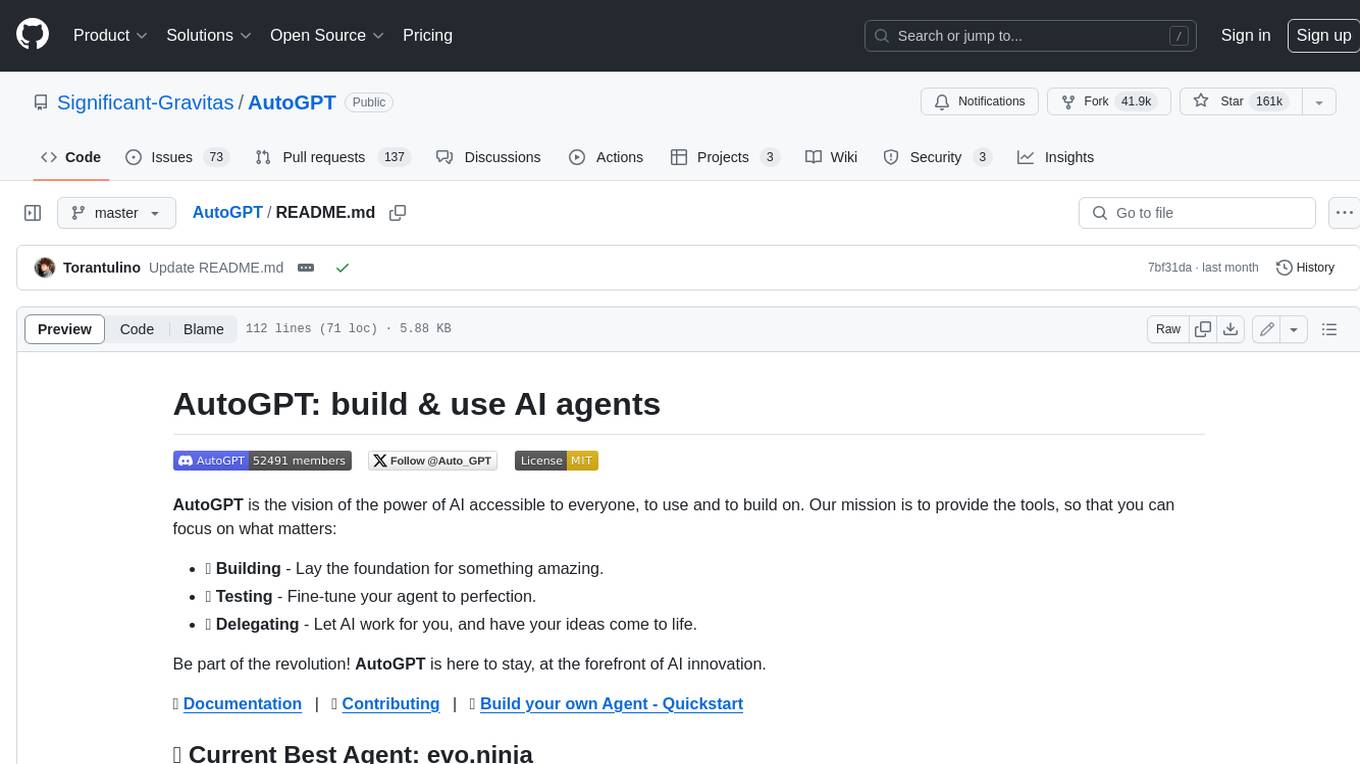
AutoGPT
AutoGPT is a revolutionary tool that empowers everyone to harness the power of AI. With AutoGPT, you can effortlessly build, test, and delegate tasks to AI agents, unlocking a world of possibilities. Our mission is to provide the tools you need to focus on what truly matters: innovation and creativity.
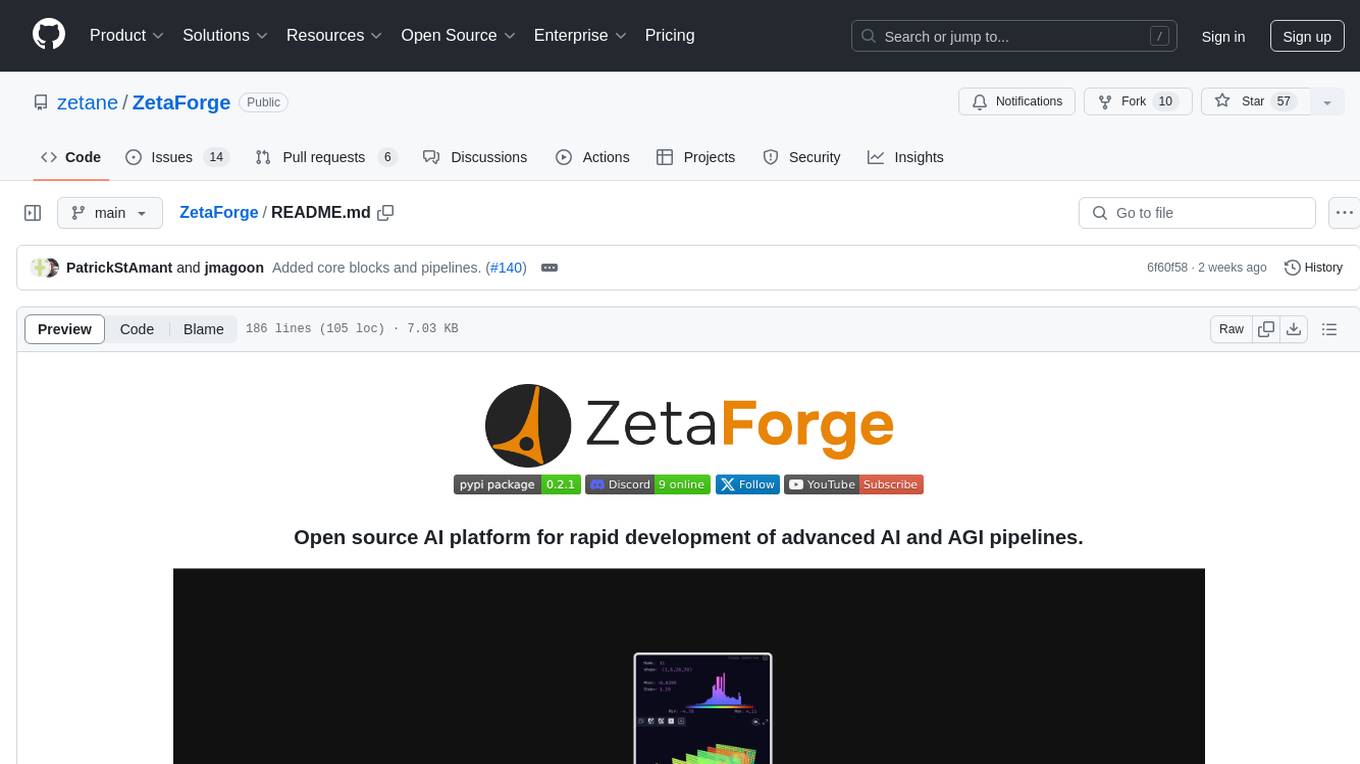
ZetaForge
ZetaForge is an open-source AI platform designed for rapid development of advanced AI and AGI pipelines. It allows users to assemble reusable, customizable, and containerized Blocks into highly visual AI Pipelines, enabling rapid experimentation and collaboration. With ZetaForge, users can work with AI technologies in any programming language, easily modify and update AI pipelines, dive into the code whenever needed, utilize community-driven blocks and pipelines, and share their own creations. The platform aims to accelerate the development and deployment of advanced AI solutions through its user-friendly interface and community support.
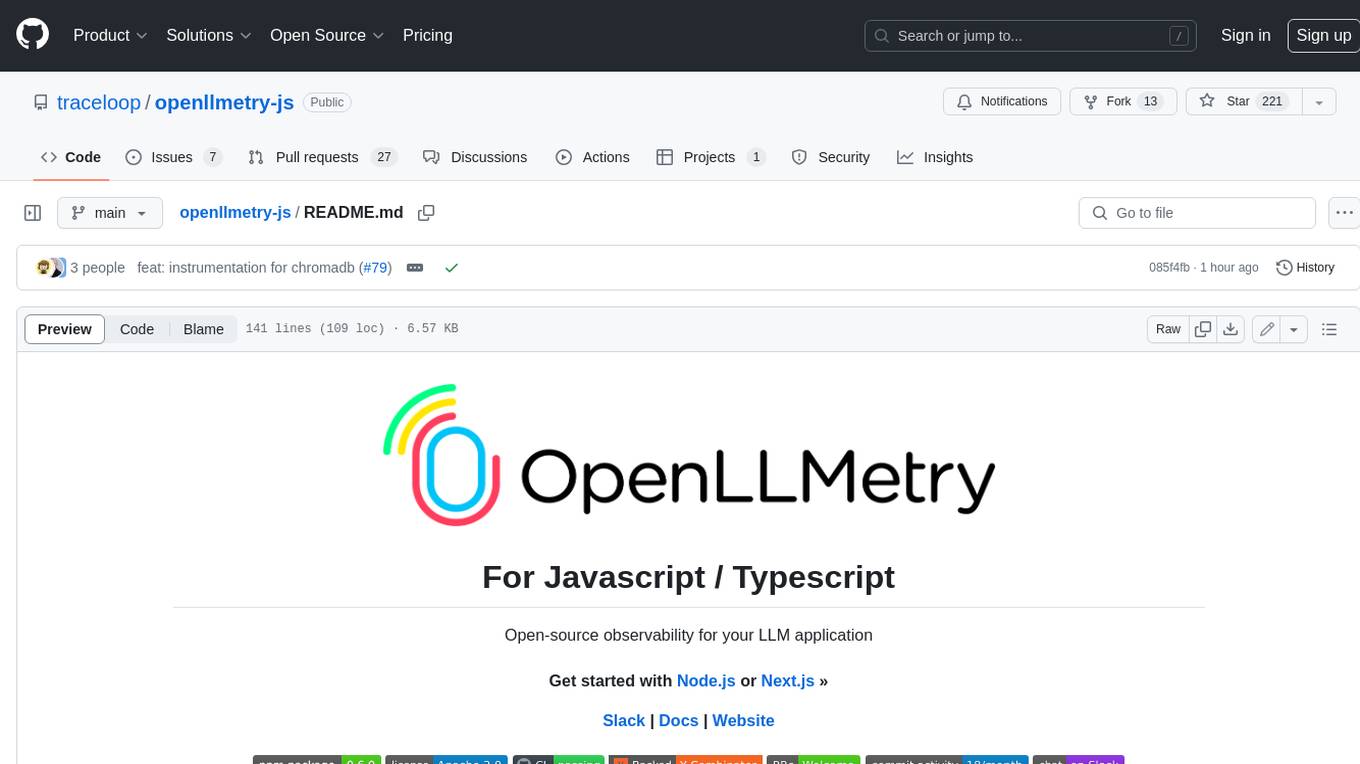
openllmetry-js
OpenLLMetry-JS is a set of extensions built on top of OpenTelemetry that gives you complete observability over your LLM application. Because it uses OpenTelemetry under the hood, it can be connected to your existing observability solutions - Datadog, Honeycomb, and others. It's built and maintained by Traceloop under the Apache 2.0 license. The repo contains standard OpenTelemetry instrumentations for LLM providers and Vector DBs, as well as a Traceloop SDK that makes it easy to get started with OpenLLMetry-JS, while still outputting standard OpenTelemetry data that can be connected to your observability stack. If you already have OpenTelemetry instrumented, you can just add any of our instrumentations directly.
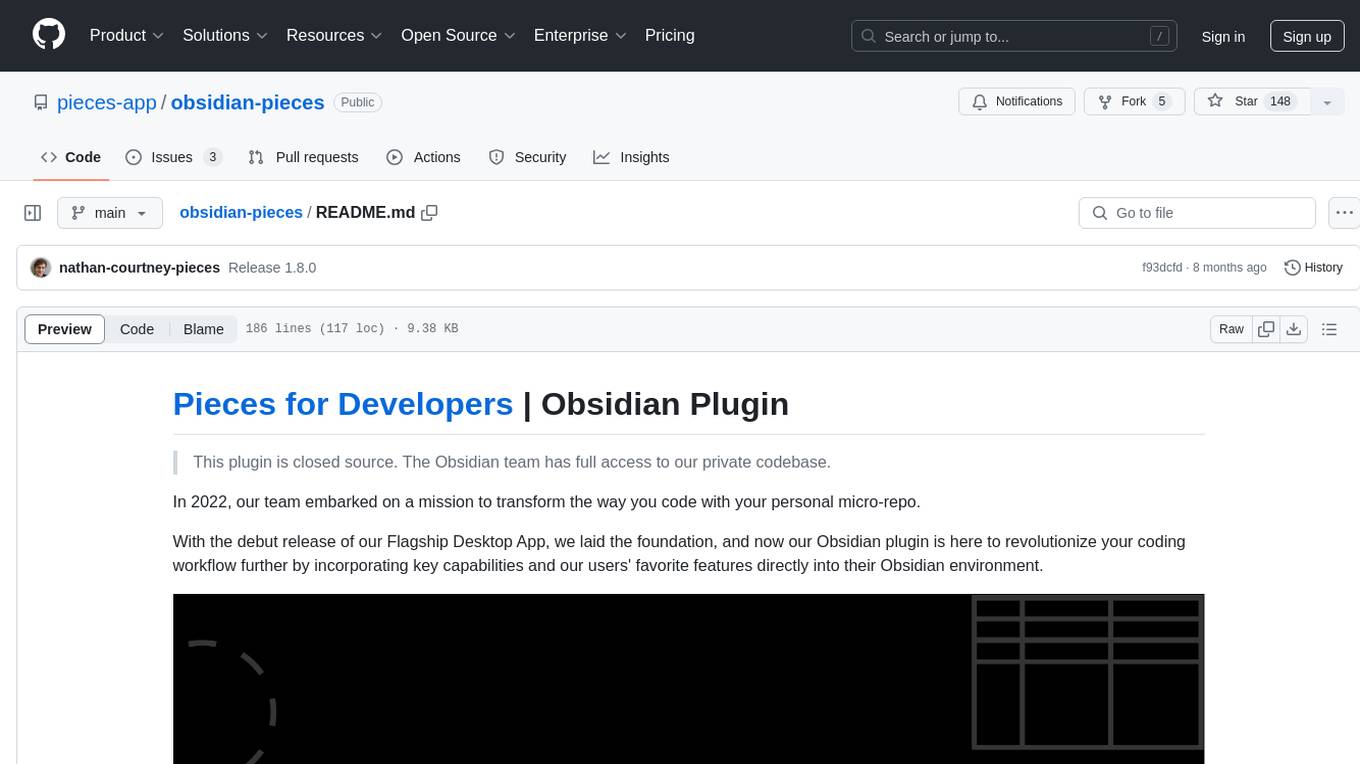
obsidian-pieces
Pieces for Developers is a closed-source Obsidian plugin designed to revolutionize coding workflows by incorporating key capabilities and favorite features directly into the Obsidian environment. The plugin, Pieces Copilot for Obsidian, enhances coding and problem-solving experiences by providing insights on code snippets, generating samples, and facilitating navigation through PRs. Users can capture, manage, share, and discover code snippets and developer materials with ease, bringing efficiency and organization to their coding experience.
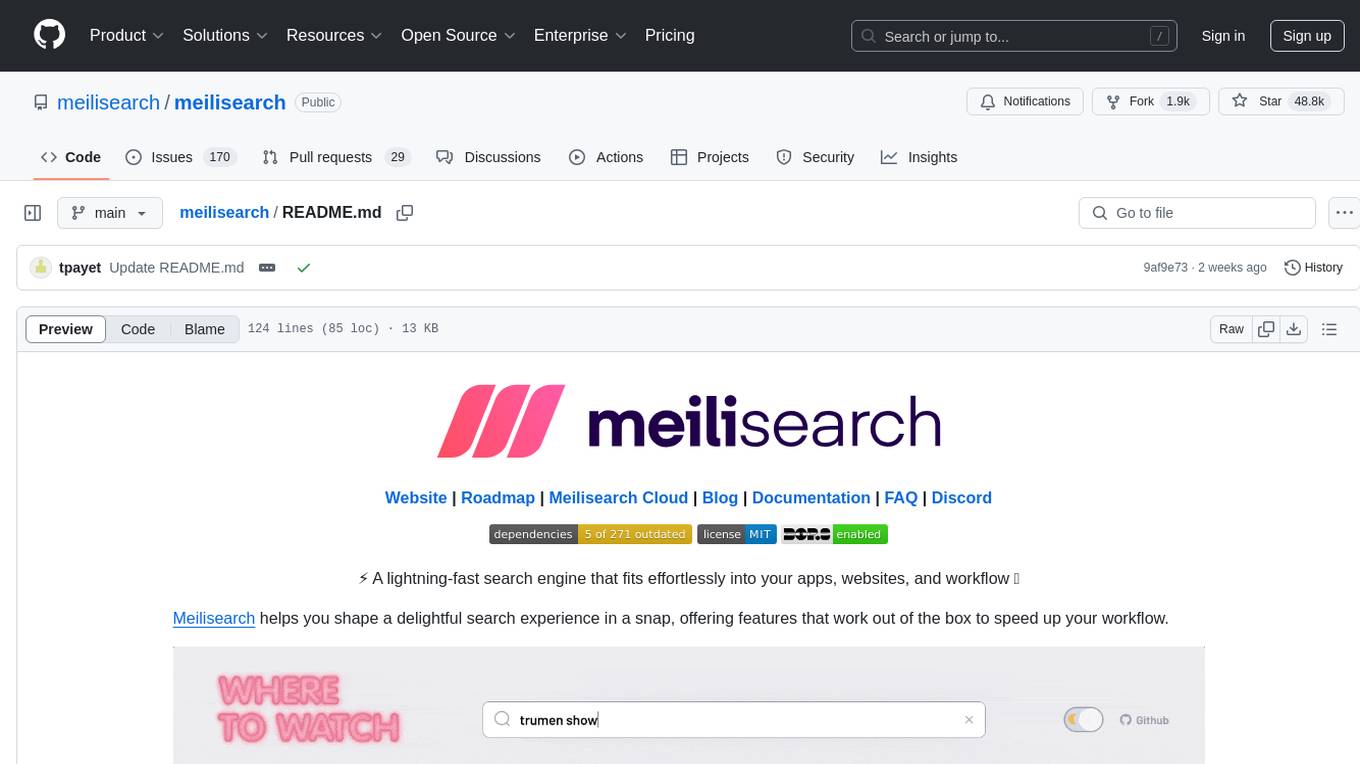
meilisearch
Meilisearch is a lightning-fast search engine that seamlessly integrates into apps, websites, and workflows. It offers features like hybrid search, search-as-you-type, typo tolerance, filtering, sorting, synonym support, geosearch, extensive language support, security management, multi-tenancy, RESTful API, AI-readiness, easy installation, deployment, and maintenance.
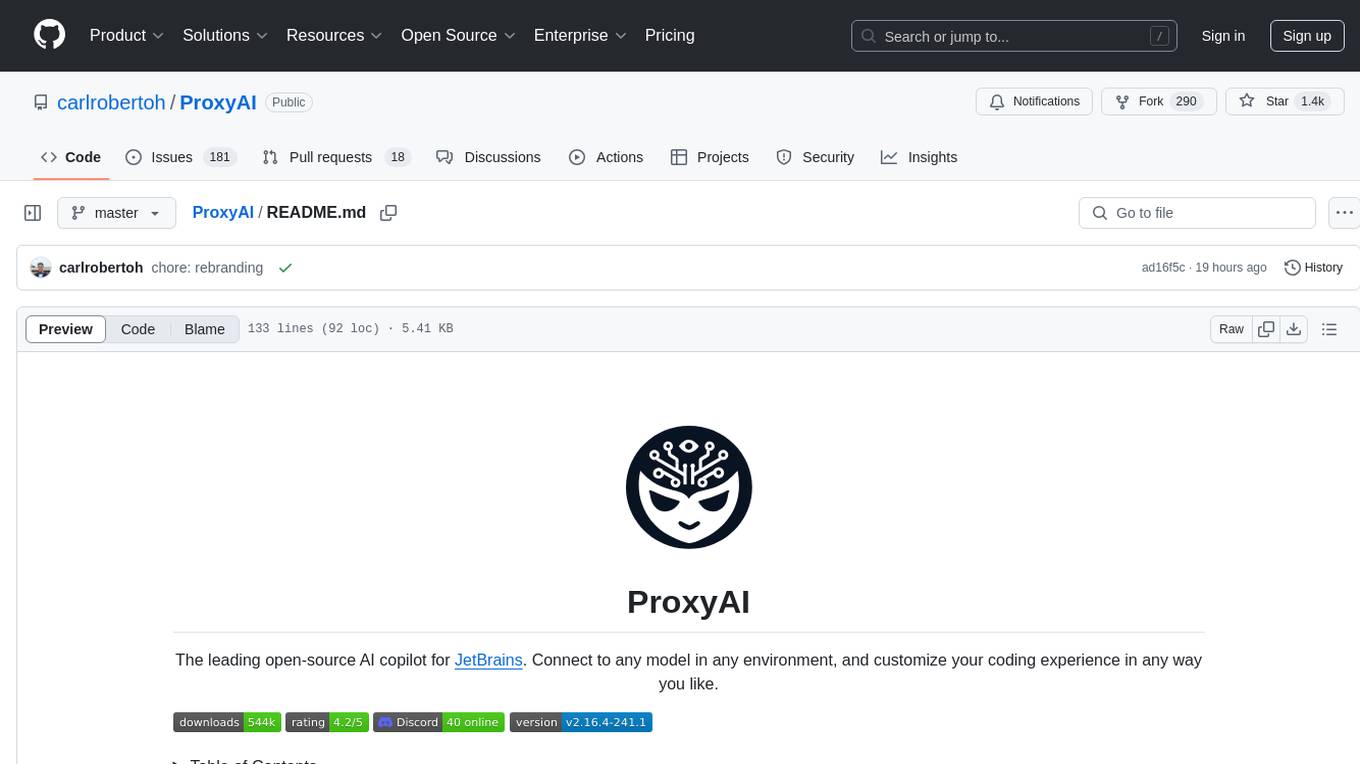
ProxyAI
ProxyAI is an open-source AI copilot for JetBrains, offering advanced code assistance features powered by top-tier language models. Users can customize their coding experience, receive AI-suggested code changes, autocomplete suggestions, and context-aware naming suggestions. The tool also allows users to chat with images, reference project files and folders, web docs, git history, and search the web. ProxyAI prioritizes user privacy by not collecting sensitive information and only gathering anonymous usage data with consent.

CodeGPT
CodeGPT is an extension for JetBrains IDEs that provides access to state-of-the-art large language models (LLMs) for coding assistance. It offers a range of features to enhance the coding experience, including code completions, a ChatGPT-like interface for instant coding advice, commit message generation, reference file support, name suggestions, and offline development support. CodeGPT is designed to keep privacy in mind, ensuring that user data remains secure and private.
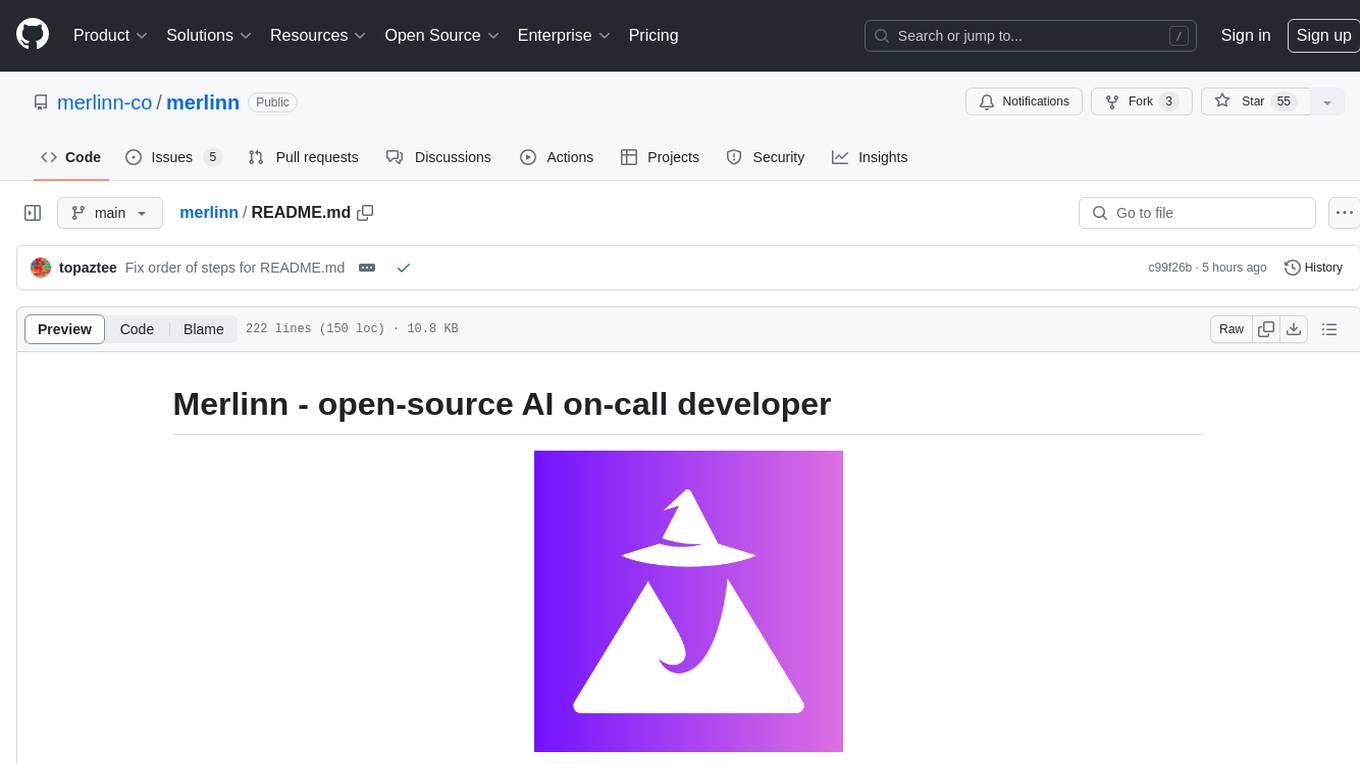
merlinn
Merlinn is an open-source AI-powered on-call engineer that automatically jumps into incidents & alerts, providing useful insights and RCA in real time. It integrates with popular observability tools, lives inside Slack, offers an intuitive UX, and prioritizes security. Users can self-host Merlinn, use it for free, and benefit from automatic RCA, Slack integration, integrations with various tools, intuitive UX, and security features.
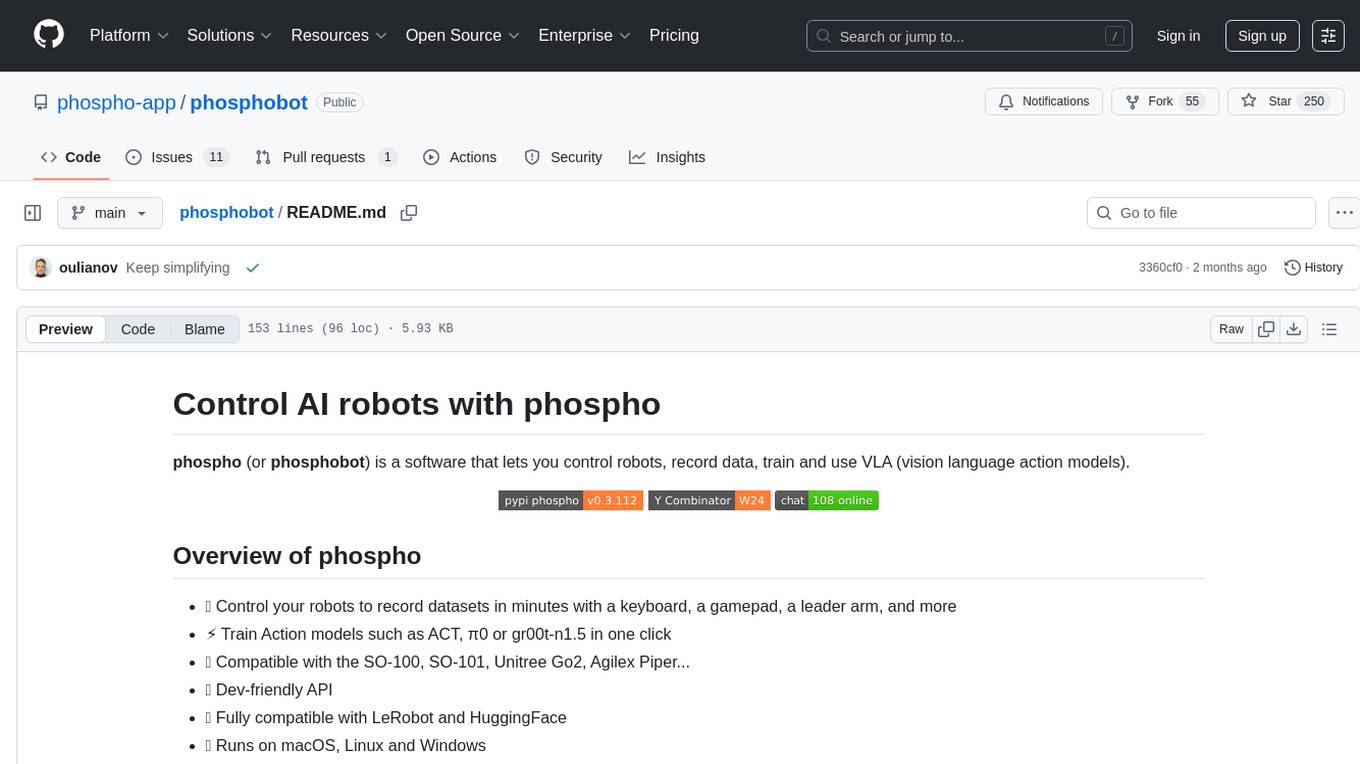
phosphobot
Phosphobot is a software tool designed to control robots, record data, train and use VLA (vision language action) models. It allows users to control robots using various input methods, train action models with ease, and is compatible with a range of robots and cameras. The tool runs on multiple operating systems and provides a user-friendly API for developers. Users can purchase a starter pack or use supported robots, record datasets, train action models, and control robots using the webapp or Python package. Phosphobot is open source, allowing users to extend its functionality with their own robots and cameras.
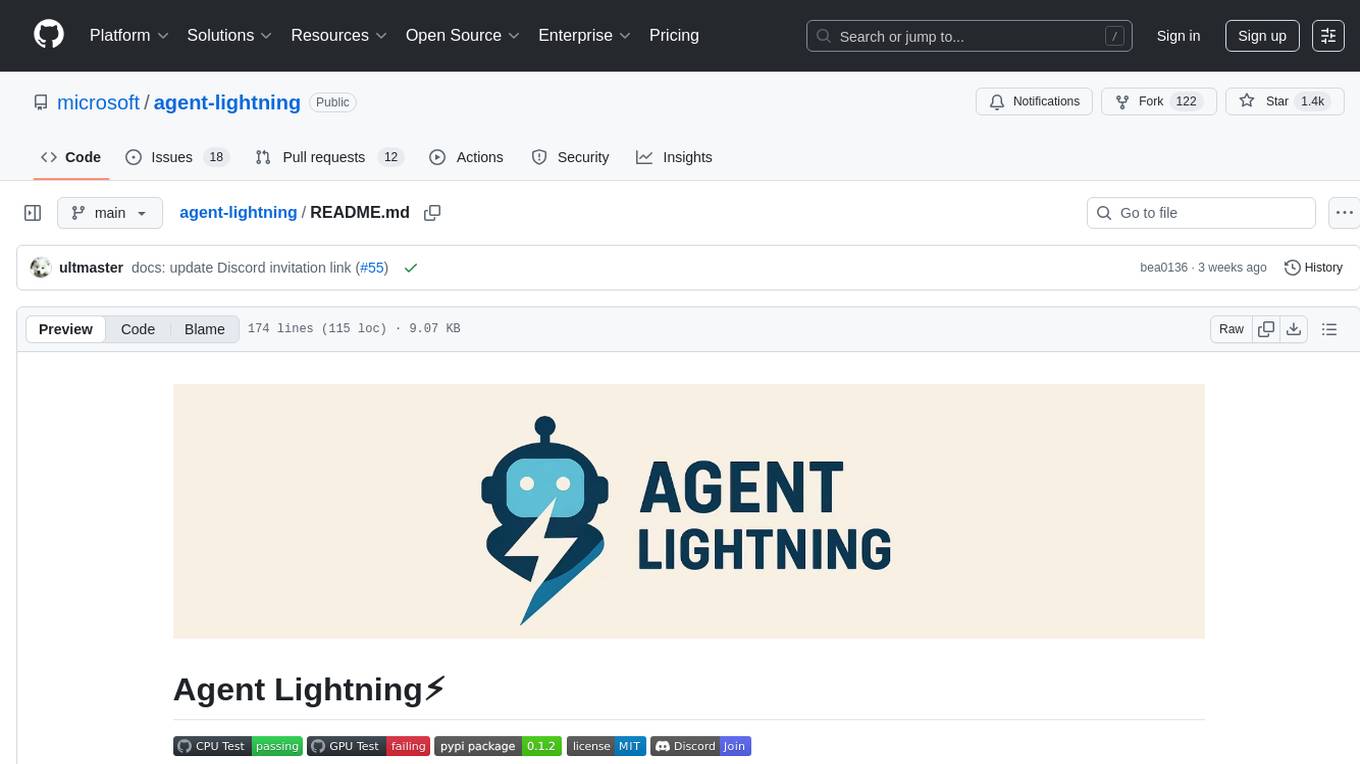
agent-lightning
Agent Lightning is a lightweight and efficient tool for automating repetitive tasks in the field of data analysis and machine learning. It provides a user-friendly interface to create and manage automated workflows, allowing users to easily schedule and execute data processing, model training, and evaluation tasks. With its intuitive design and powerful features, Agent Lightning streamlines the process of building and deploying machine learning models, making it ideal for data scientists, machine learning engineers, and AI enthusiasts looking to boost their productivity and efficiency in their projects.

Instrukt
Instrukt is a terminal-based AI integrated environment that allows users to create and instruct modular AI agents, generate document indexes for question-answering, and attach tools to any agent. It provides a platform for users to interact with AI agents in natural language and run them inside secure containers for performing tasks. The tool supports custom AI agents, chat with code and documents, tools customization, prompt console for quick interaction, LangChain ecosystem integration, secure containers for agent execution, and developer console for debugging and introspection. Instrukt aims to make AI accessible to everyone by providing tools that empower users without relying on external APIs and services.

plandex
Plandex is an open source, terminal-based AI coding engine designed for complex tasks. It uses long-running agents to break up large tasks into smaller subtasks, helping users work through backlogs, navigate unfamiliar technologies, and save time on repetitive tasks. Plandex supports various AI models, including OpenAI, Anthropic Claude, Google Gemini, and more. It allows users to manage context efficiently in the terminal, experiment with different approaches using branches, and review changes before applying them. The tool is platform-independent and runs from a single binary with no dependencies.
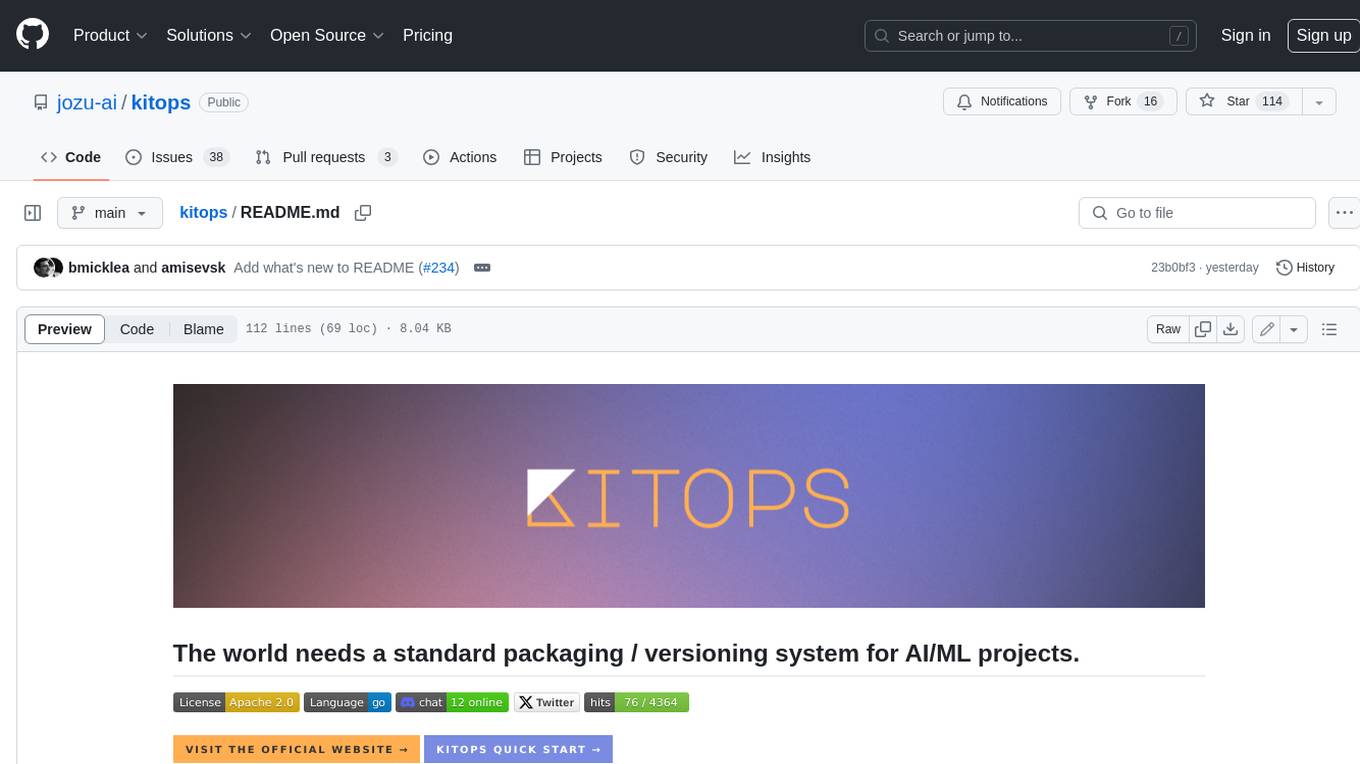
kitops
KitOps is a packaging and versioning system for AI/ML projects that uses open standards so it works with the AI/ML, development, and DevOps tools you are already using. KitOps simplifies the handoffs between data scientists, application developers, and SREs working with LLMs and other AI/ML models. KitOps' ModelKits are a standards-based package for models, their dependencies, configurations, and codebases. ModelKits are portable, reproducible, and work with the tools you already use.
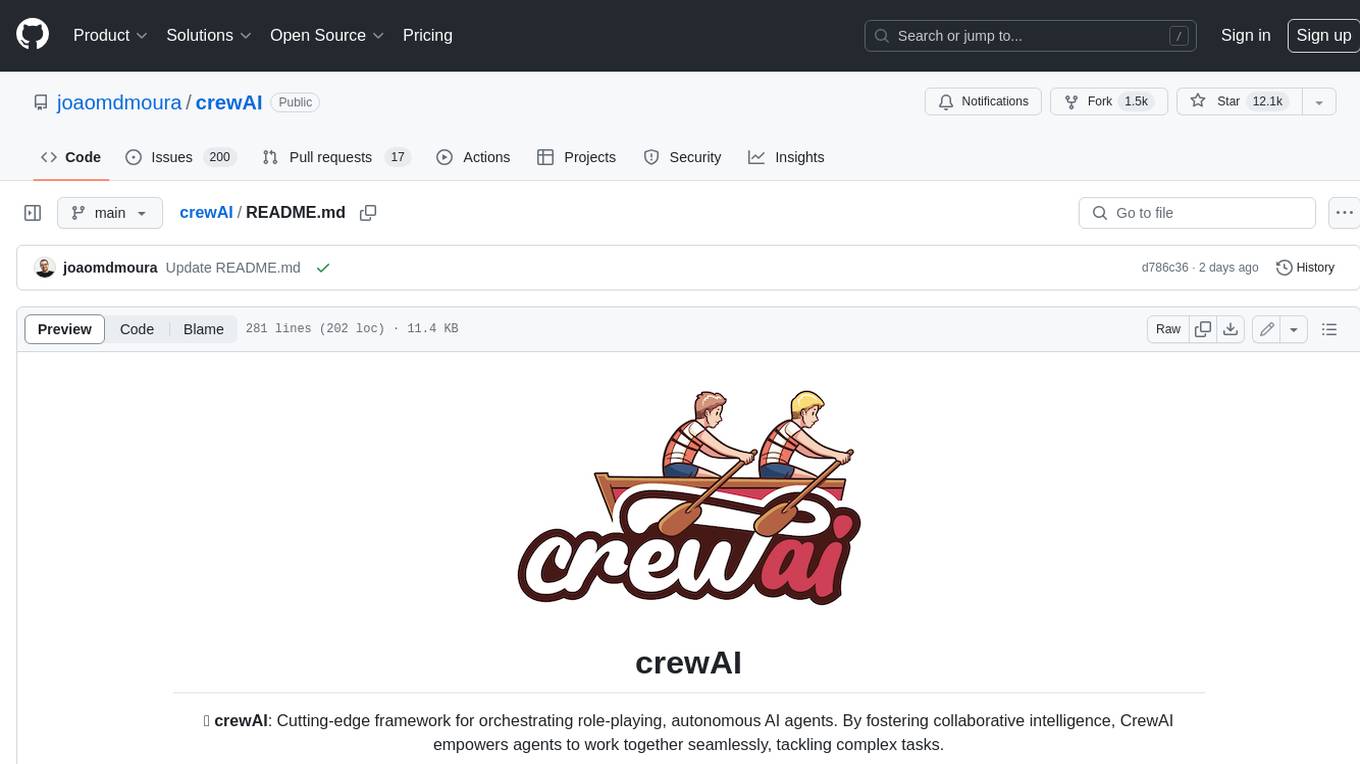
crewAI
crewAI is a cutting-edge framework for orchestrating role-playing, autonomous AI agents. By fostering collaborative intelligence, CrewAI empowers agents to work together seamlessly, tackling complex tasks. It provides a flexible and structured approach to AI collaboration, enabling users to define agents with specific roles, goals, and tools, and assign them tasks within a customizable process. crewAI supports integration with various LLMs, including OpenAI, and offers features such as autonomous task delegation, flexible task management, and output parsing. It is open-source and welcomes contributions, with a focus on improving the library based on usage data collected through anonymous telemetry.
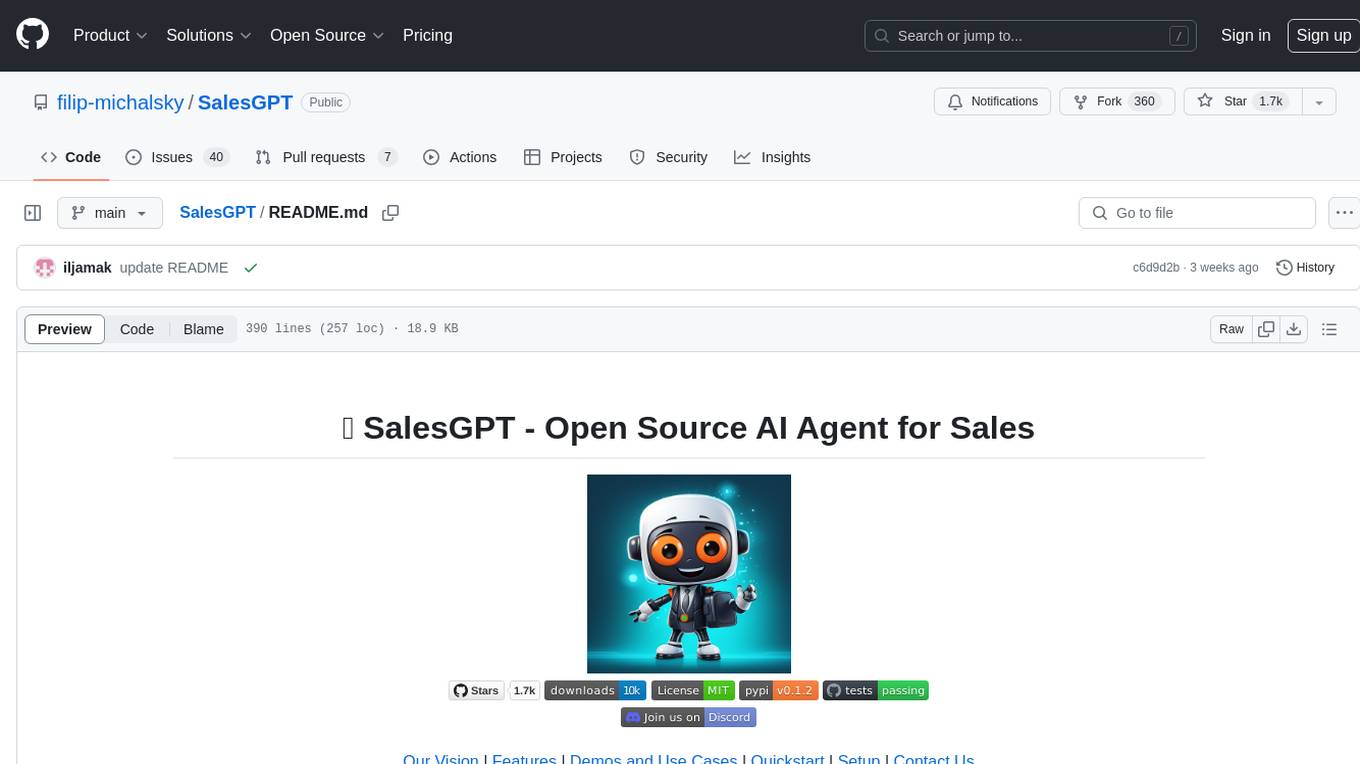
SalesGPT
SalesGPT is an open-source AI agent designed for sales, utilizing context-awareness and LLMs to work across various communication channels like voice, email, and texting. It aims to enhance sales conversations by understanding the stage of the conversation and providing tools like product knowledge base to reduce errors. The agent can autonomously generate payment links, handle objections, and close sales. It also offers features like automated email communication, meeting scheduling, and integration with various LLMs for customization. SalesGPT is optimized for low latency in voice channels and ensures human supervision where necessary. The tool provides enterprise-grade security and supports LangSmith tracing for monitoring and evaluation of intelligent agents built on LLM frameworks.
For similar tasks

langwatch
LangWatch is a monitoring and analytics platform designed to track, visualize, and analyze interactions with Large Language Models (LLMs). It offers real-time telemetry to optimize LLM cost and latency, a user-friendly interface for deep insights into LLM behavior, user analytics for engagement metrics, detailed debugging capabilities, and guardrails to monitor LLM outputs for issues like PII leaks and toxic language. The platform supports OpenAI and LangChain integrations, simplifying the process of tracing LLM calls and generating API keys for usage. LangWatch also provides documentation for easy integration and self-hosting options for interested users.
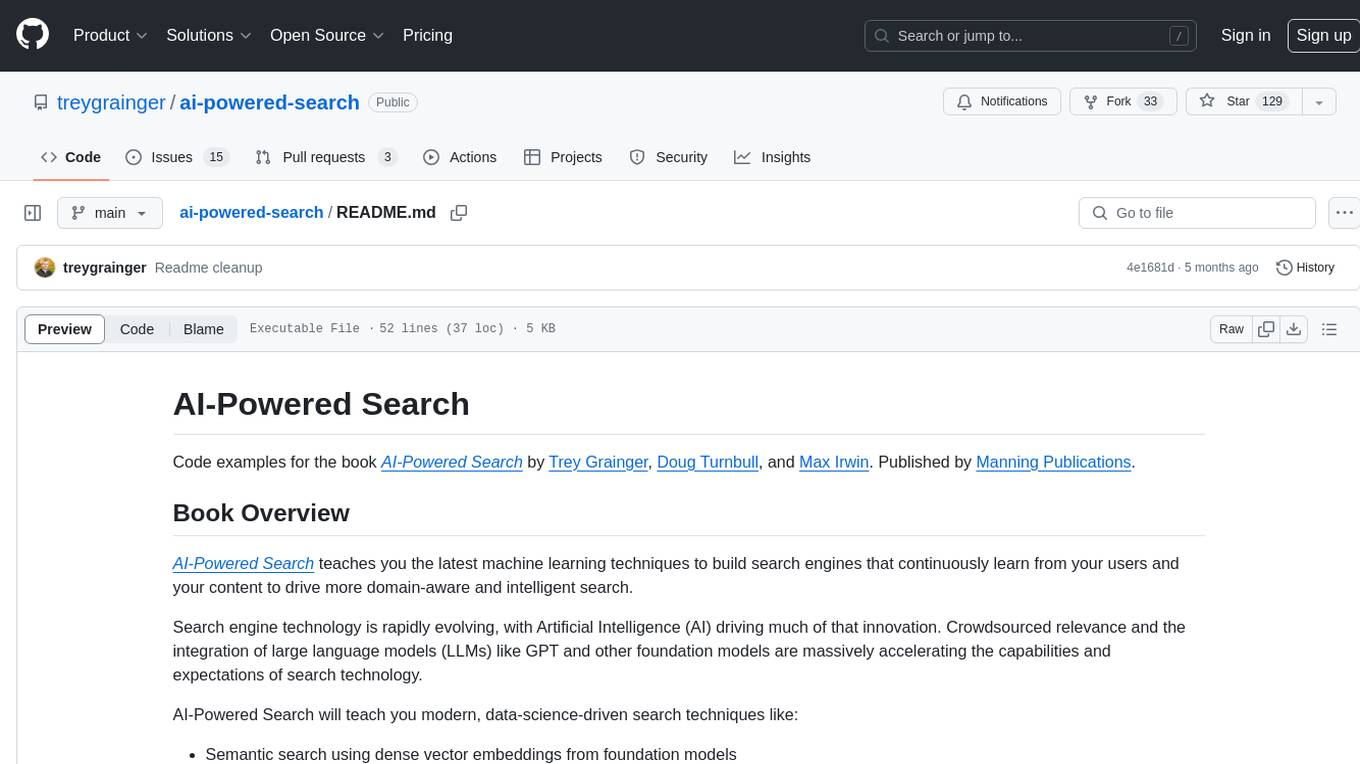
ai-powered-search
AI-Powered Search provides code examples for the book 'AI-Powered Search' by Trey Grainger, Doug Turnbull, and Max Irwin. The book teaches modern machine learning techniques for building search engines that continuously learn from users and content to deliver more intelligent and domain-aware search experiences. It covers semantic search, retrieval augmented generation, question answering, summarization, fine-tuning transformer-based models, personalized search, machine-learned ranking, click models, and more. The code examples are in Python, leveraging PySpark for data processing and Apache Solr as the default search engine. The repository is open source under the Apache License, Version 2.0.
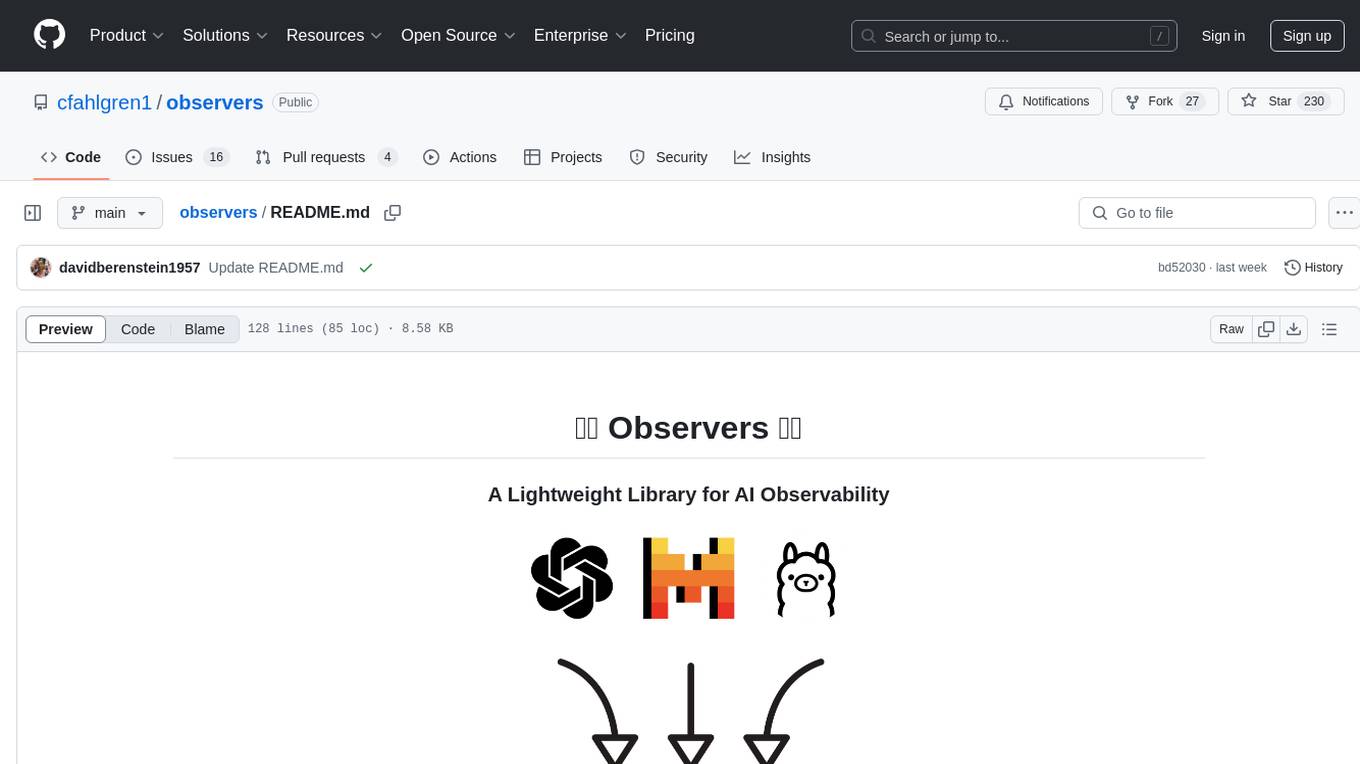
observers
Observers is a lightweight library for AI observability that provides support for various generative AI APIs and storage backends. It allows users to track interactions with AI models and sync observations to different storage systems. The library supports OpenAI, Hugging Face transformers, AISuite, Litellm, and Docling for document parsing and export. Users can configure different stores such as Hugging Face Datasets, DuckDB, Argilla, and OpenTelemetry to manage and query their observations. Observers is designed to enhance AI model monitoring and observability in a user-friendly manner.

databend
Databend is an open-source cloud data warehouse that serves as a cost-effective alternative to Snowflake. With its focus on fast query execution and data ingestion, it's designed for complex analysis of the world's largest datasets.
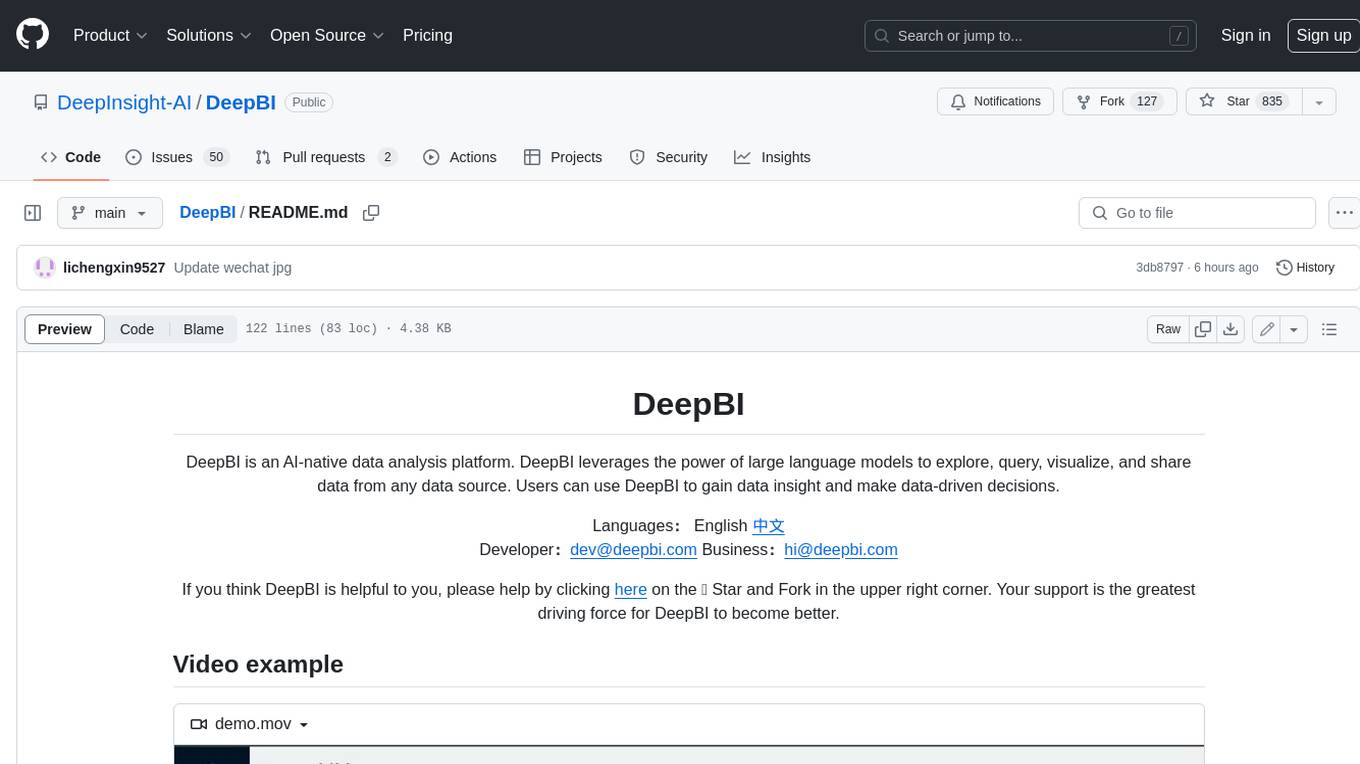
DeepBI
DeepBI is an AI-native data analysis platform that leverages the power of large language models to explore, query, visualize, and share data from any data source. Users can use DeepBI to gain data insight and make data-driven decisions.
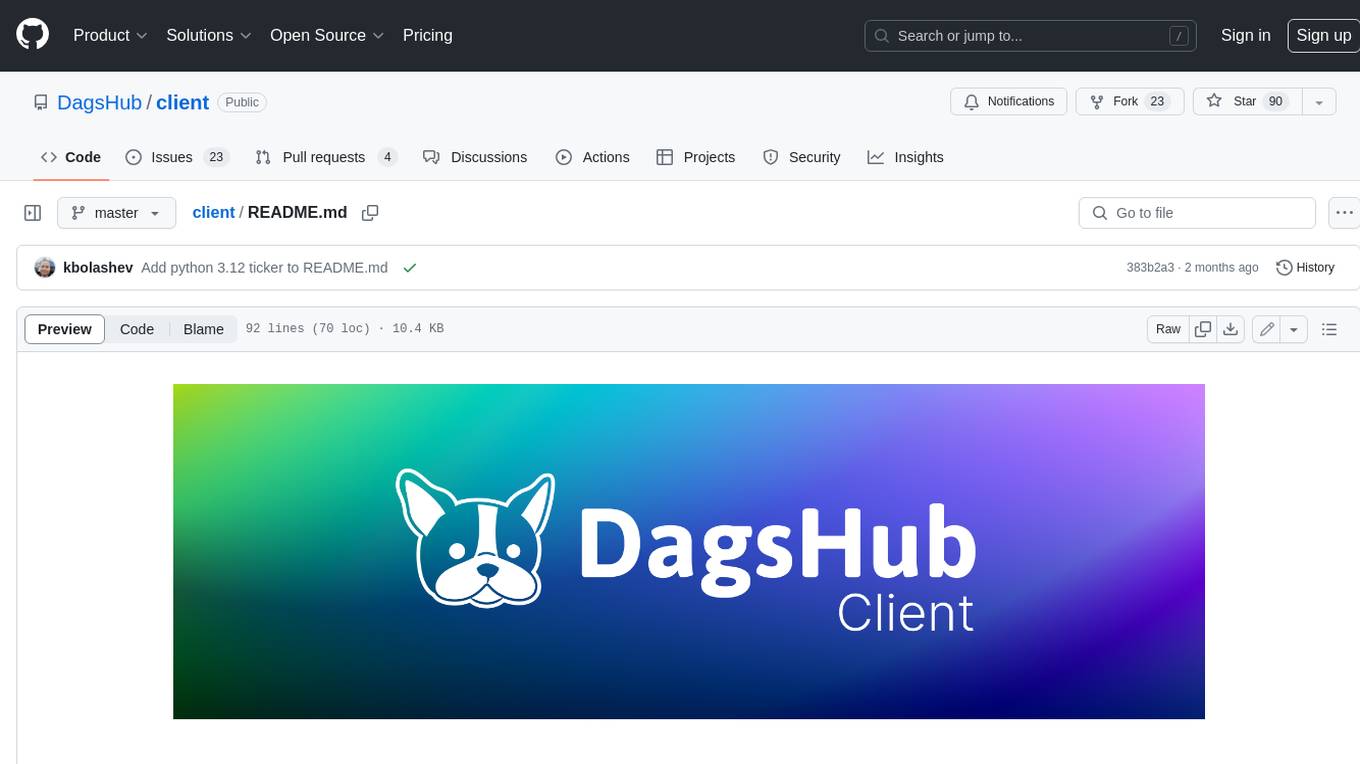
client
DagsHub is a platform for machine learning and data science teams to build, manage, and collaborate on their projects. With DagsHub you can: 1. Version code, data, and models in one place. Use the free provided DagsHub storage or connect it to your cloud storage 2. Track Experiments using Git, DVC or MLflow, to provide a fully reproducible environment 3. Visualize pipelines, data, and notebooks in and interactive, diff-able, and dynamic way 4. Label your data directly on the platform using Label Studio 5. Share your work with your team members 6. Stream and upload your data in an intuitive and easy way, while preserving versioning and structure. DagsHub is built firmly around open, standard formats for your project. In particular: * Git * DVC * MLflow * Label Studio * Standard data formats like YAML, JSON, CSV Therefore, you can work with DagsHub regardless of your chosen programming language or frameworks.
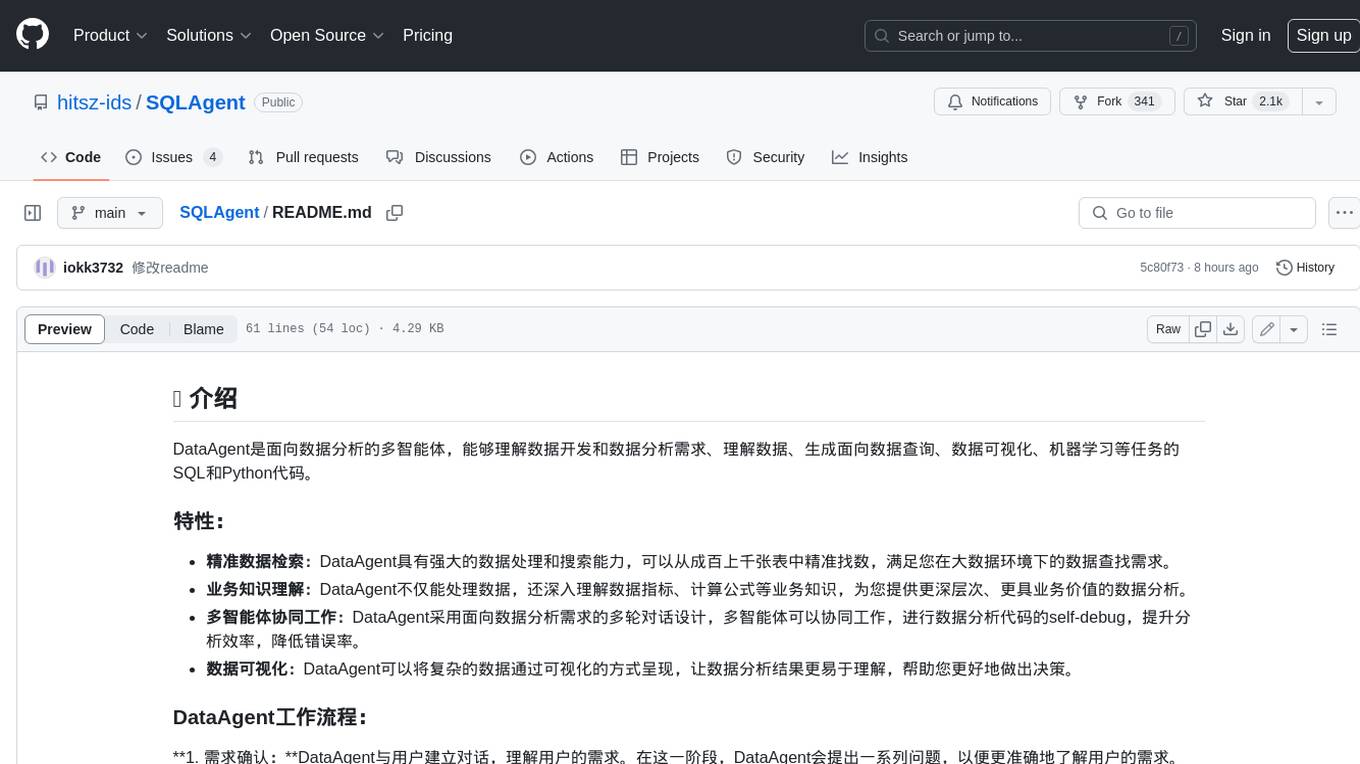
SQLAgent
DataAgent is a multi-agent system for data analysis, capable of understanding data development and data analysis requirements, understanding data, and generating SQL and Python code for tasks such as data query, data visualization, and machine learning.
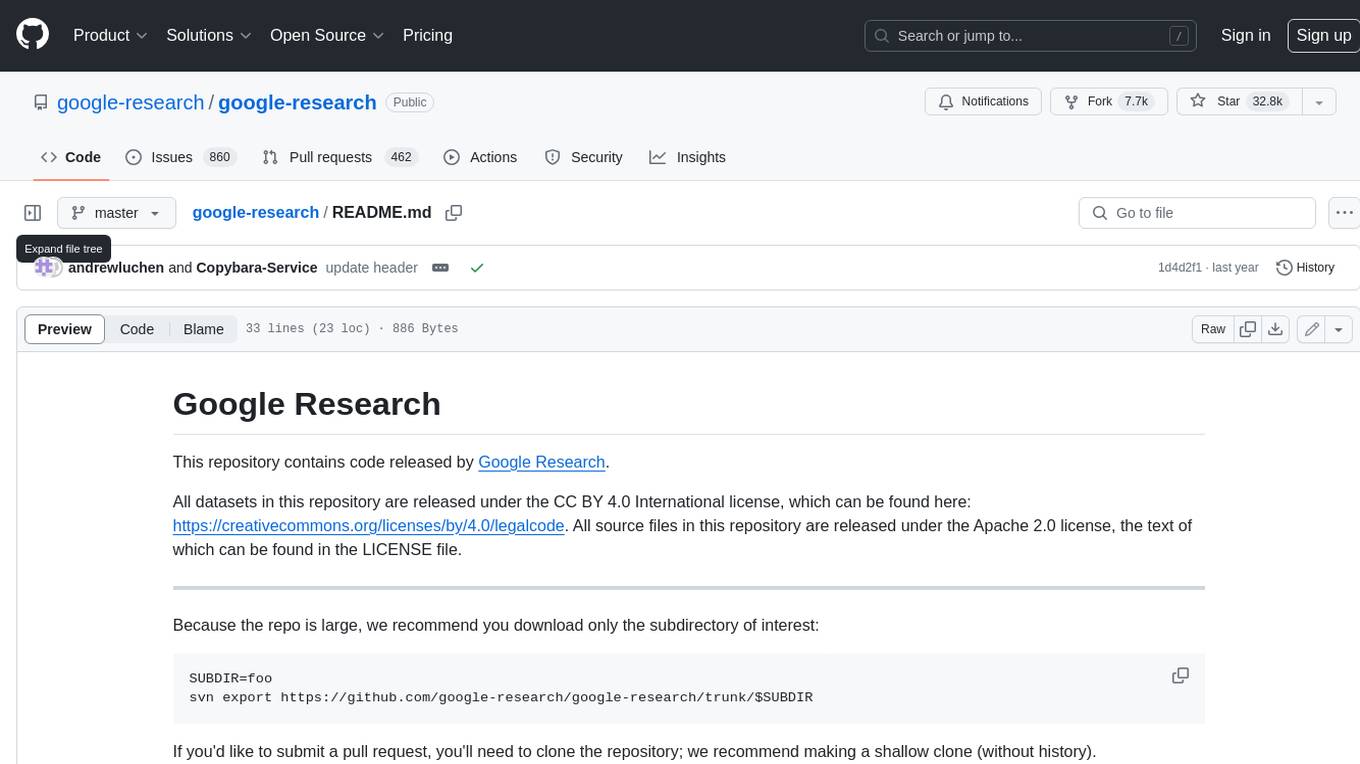
google-research
This repository contains code released by Google Research. All datasets in this repository are released under the CC BY 4.0 International license, which can be found here: https://creativecommons.org/licenses/by/4.0/legalcode. All source files in this repository are released under the Apache 2.0 license, the text of which can be found in the LICENSE file.
For similar jobs

weave
Weave is a toolkit for developing Generative AI applications, built by Weights & Biases. With Weave, you can log and debug language model inputs, outputs, and traces; build rigorous, apples-to-apples evaluations for language model use cases; and organize all the information generated across the LLM workflow, from experimentation to evaluations to production. Weave aims to bring rigor, best-practices, and composability to the inherently experimental process of developing Generative AI software, without introducing cognitive overhead.

LLMStack
LLMStack is a no-code platform for building generative AI agents, workflows, and chatbots. It allows users to connect their own data, internal tools, and GPT-powered models without any coding experience. LLMStack can be deployed to the cloud or on-premise and can be accessed via HTTP API or triggered from Slack or Discord.

VisionCraft
The VisionCraft API is a free API for using over 100 different AI models. From images to sound.

kaito
Kaito is an operator that automates the AI/ML inference model deployment in a Kubernetes cluster. It manages large model files using container images, avoids tuning deployment parameters to fit GPU hardware by providing preset configurations, auto-provisions GPU nodes based on model requirements, and hosts large model images in the public Microsoft Container Registry (MCR) if the license allows. Using Kaito, the workflow of onboarding large AI inference models in Kubernetes is largely simplified.

PyRIT
PyRIT is an open access automation framework designed to empower security professionals and ML engineers to red team foundation models and their applications. It automates AI Red Teaming tasks to allow operators to focus on more complicated and time-consuming tasks and can also identify security harms such as misuse (e.g., malware generation, jailbreaking), and privacy harms (e.g., identity theft). The goal is to allow researchers to have a baseline of how well their model and entire inference pipeline is doing against different harm categories and to be able to compare that baseline to future iterations of their model. This allows them to have empirical data on how well their model is doing today, and detect any degradation of performance based on future improvements.

tabby
Tabby is a self-hosted AI coding assistant, offering an open-source and on-premises alternative to GitHub Copilot. It boasts several key features: * Self-contained, with no need for a DBMS or cloud service. * OpenAPI interface, easy to integrate with existing infrastructure (e.g Cloud IDE). * Supports consumer-grade GPUs.

spear
SPEAR (Simulator for Photorealistic Embodied AI Research) is a powerful tool for training embodied agents. It features 300 unique virtual indoor environments with 2,566 unique rooms and 17,234 unique objects that can be manipulated individually. Each environment is designed by a professional artist and features detailed geometry, photorealistic materials, and a unique floor plan and object layout. SPEAR is implemented as Unreal Engine assets and provides an OpenAI Gym interface for interacting with the environments via Python.

Magick
Magick is a groundbreaking visual AIDE (Artificial Intelligence Development Environment) for no-code data pipelines and multimodal agents. Magick can connect to other services and comes with nodes and templates well-suited for intelligent agents, chatbots, complex reasoning systems and realistic characters.






